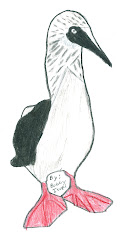Students, the directions about getting published on our blog are pretty far down at this point (the newest blog entries are on the top). The entry titled "Do you want to get published? Read on!" from September 16th explains how this blog works. Remember, you can ask questions, answer questions, illustrate, or find resources.
There are several questions on the table to be answered:
"Scientific Names" by Alex on September 21
"Predator-Prey Relationships" by Crystal on September 21
"Are there red-footed boobies also? by Pam on September 21
"Blue Morpho" by Stacey on September 21
"Natural Predators" by Aura on September 19
"Park Rules" by Alex on September 19
"Will I need an umbrella?" by Caroline on September 19
"Endemic Species" by Spencer on September 19
"Islands, Islets, & Rocks" by Pam on September 19
"Not typically tropical" by Cara on September 19
"Sexual Dimorphism" by Savannah on September 19
"What makes the islands so special?" by Om on September 19
Get involved and stay involved! You will be better prepared for our Galapagos Gala when I return!
mbarrett@mountlaurel.k12.nj.us
Saturday, September 22, 2007
Charles Darwin Research Station
Amanda from pd. 2...
I was just wondering, you said you were going to study the tortoises, but I wasn't sure what you were exactly going to be studying about them. I love turtles and my grandparents went to the Galapagos Islands before and were up close next to the giant tortoises. I really hope there is nothing wrong with the wildlife there.
Amanda, I love turtles, too! The Charles Darwin Research Station on Santa Cruz (one of the Galapagos Islands) is trying to help the Galapagos tortoises by collecting eggs from the wild. They hatch and raise the turtles in captivity until they reach a size that they feel would have a good chance of survival in the wild. They also have a captive breeding program at the station. In addition, the Galapagos National Park Service will sometimes hunt feral predators and competitors. I will be visiting the Darwin Research Station to learn about these programs and if they have been successful in helping increase the tortoise population. Ask your grandparents if they visited the station. If the research station has brochures or pamphlets, I will bring some back for you. Thanks for caring about wildlife!
I just found a really great website for you and your family. It is all about the Galapagos tortoises, including threats to survival and conservation measures being taken.
http://www.discovergalapagos.com/tortoise.html#BREEDING
I was just wondering, you said you were going to study the tortoises, but I wasn't sure what you were exactly going to be studying about them. I love turtles and my grandparents went to the Galapagos Islands before and were up close next to the giant tortoises. I really hope there is nothing wrong with the wildlife there.
Amanda, I love turtles, too! The Charles Darwin Research Station on Santa Cruz (one of the Galapagos Islands) is trying to help the Galapagos tortoises by collecting eggs from the wild. They hatch and raise the turtles in captivity until they reach a size that they feel would have a good chance of survival in the wild. They also have a captive breeding program at the station. In addition, the Galapagos National Park Service will sometimes hunt feral predators and competitors. I will be visiting the Darwin Research Station to learn about these programs and if they have been successful in helping increase the tortoise population. Ask your grandparents if they visited the station. If the research station has brochures or pamphlets, I will bring some back for you. Thanks for caring about wildlife!
I just found a really great website for you and your family. It is all about the Galapagos tortoises, including threats to survival and conservation measures being taken.
http://www.discovergalapagos.com/tortoise.html#BREEDING
Subscribe to:
Comments (Atom)


